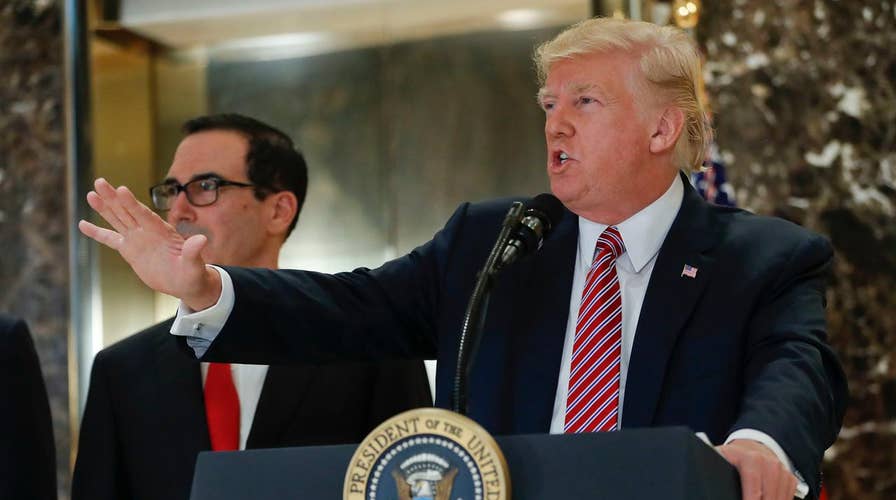Can Trump get his agenda back on track?
Economist Ben Stein on the firing of Steve Bannon and President Trump’s political agenda.
President Trump hinted Saturday that he and top U.S. generals have agreed on a new strategy for the war in Afghanistan, after huddling Friday at the presidential Camp David retreat.
"Important day spent at Camp David with our very talented Generals and military leaders," Trump tweeted. "Many decisions made, including on Afghanistan."
Since taking office, Trump has considered several options for Afghanistan, from sending in additional troops to walking away from the war, an unlikely move considering U.S. concerns about thwarting Islamic terrorism.
Solutions for Afghanistan, which include ending the longest war in American history, eluded the Obama administration and haven't come easily to Trump.
The challenge is largely how to step up the fight against terrorism in a way that advances peace prospects -- in large part because the Taliban has been gaining ground and shows no interest in peace negotiations.
Trump met at the presidential retreat, in nearby western Maryland, with Secretary of State Rex Tillerson, Defense Secretary Jim Mattis, top intelligence agency officials and other top military and diplomatic aides.
Mattis said earlier this week the administration was "very close" to finalizing a new approach and that the talks in the Catoctin Mountains will help the president and his team move toward a decision.
"We are coming very close,” he said. “And I anticipate (a decision) in the very near future.”
Gen. Joseph Votel, the Central Command chief who is responsible for U.S. military operations in the greater Middle East, was not part of the meetings.
Votel said Mattis and Gen. Joseph Dunford, the Joint Chiefs chairman, represent him in the White House-led Afghanistan strategy review.
He also said he has not talked directly to Trump as part of the months-long review.
White House press secretary Sarah Huckabee Sanders issued a brief statement earlier this week saying Trump had been briefed extensively on a new strategy to protect America's interests in the region. But she did not specifically mention Afghanistan.
The U.S. has about 8,400 troops in Afghanistan. Their primary roles are to train and advise Afghan forces and to hunt down and kill members of Al Qaeda and other extremist groups.
Months ago, the Pentagon settled on a plan to send about 3,800 additional troops to strengthen the Afghan army, which is stuck in what some call a deteriorating situation with the Taliban insurgency.
Within the White House, questions persist about the wisdom of investing further resources in the war. Even if the administration decides to add more troops, it's unclear whether they could get there quickly enough to make a difference in the current Afghan fighting season, which winds down in autumn.
The administration has said its Afghanistan strategy will be informed by a review of its approach to the broader region, including Pakistan and India. The Taliban have long used Pakistan as a sanctuary, complicating efforts to defeat the insurgency in Afghanistan and stabilize the country.
The region includes other actors who pose political problems for Washington, including Iran, which has influence in western Afghanistan.
The outlook is clouded by the Afghan government's struggle to halt Taliban advances on its own. The U.S. special inspector general for Afghanistan reconstruction has said the Taliban hold sway in almost half the country.
Government forces also are battling an Islamic State affiliate that has carved out a foothold, mostly in the east. Trump has vowed to crush IS, so its expansion in Afghanistan poses an additional challenge with no obvious solution. Just this week, a U.S. soldier was killed and nearly a dozen wounded in combat with IS fighters.
Trump has expressed frustration at the prolonged fighting in Afghanistan. Earlier this summer he raised the idea of firing the top U.S. commander there, Gen. John Nicholson.
Asked this week if Trump has confidence in Nicholson, Mattis demurred. "Ask the president," he answered.
Trump is "looking at all aspects" of U.S. involvement in Afghanistan "as he must in his responsibilities as the commander in chief," Mattis said.
Nicholson also was not participating in Friday's talks at Camp David.
The Associated Press contributed to this report.





